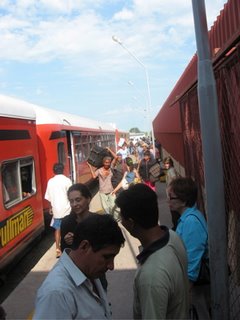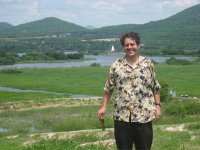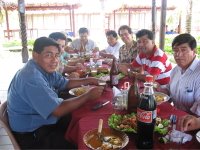
The head of the local journalists association invited me to come with him and four other guys on a weekend trip to far eastern Bolivia to provide training to local journalists. The only way to get there is by train. It's a 16-hour trip, about 380 miles, and the train rocks and rolls slowly along the rough roadbed, rarely going much faster than about 30 miles an hour. I had heard bad things about this train from my tour book, which calls it the death train, but apart from looking a little tired and down at the heels, the car we were in was air conditioned, the seats leaned back much farther than they usually do on a train or plane, and they had movies and music videos on overhead screens. From the guidebook I had pictured people carrying their chickens and pigs. No such thing. I actually slept well. The fare was about $13. (It did live up to its reputation on the return trip, however.)
We got to Puerto Suarez about 8:30 in the morning and headed to the hotel to shower before doing our daylong program. The hotel was about $3 per person per night, a one-story stucco affair with very simple beds, a fan and a shower. I was OK with it, but I wondered how Cindy would have felt.

We went to the town hall, which is open-air, and waited for the dignitaries and local journalists to arrive. We got going about an hour late. It's a big deal for people from the big city to show up here, so two local political officials welcomed us. I presented first. We improvised a setup in which we played part of the ethics video, which is in Spanish, on my laptop, hooked it up to a TV and held the mike close to the speakers on my computer so the audience could hear it. The video shows a case of a Honduran TV reporter who gets involved in the police activity that leads to the arrest of a fugitive colonel charged in the murders of political opponents. The local journalists really got into it and we had a lively discussion.
The journalists who work out here are what are known as empiricos, or self-trained, for the most part. They were thrilled to have people come and offer training. At the end of the day, they made speeches about how grateful they were and used all sorts of honorifics to describe us as esteemed and brilliant and accomplished. Made us all feel pretty good. In the photo above, I'm standing with the hills of Brazil behind me.

This photo shows us at a little resort where we had lunch of deep-fried crocodile nuggets and pirranha soup. No kidding. I wanted to jump into the water and cool off, but it didn't seem like a good idea after eating the pirranha. Would they know?
Luis, the TV producer, Hernan and I decided to cross over into Brazil Saturday night. A local journalist agreed to take us if we would fill up his tank with gasoline. It's about a half-hour ride and gasoline is scarce here along the border because of all the smuggling. Gasoline on the Bolivian side is about half the price it is on the Brazilian side, so no one wants the gasoline to get to the Bolivian dealers. So we bought gasoline in plastic jugs from a couple of women by the side of the road. We paid the equivalent of about $3 a gallon, double the legal rate for Bolivia.
The roads on the Brazilian side are much better constructed and maintained. The town of Corumba lies right on the River Paraguay and has big excursion boats docked all long its waterfront. Luis wanted us to see real Brazilian samba dancing, so he asked some locals, who told us to go to a place called Babylonia. I wasn´t comfortable in the place, and I don´t drink, so Luis started kidding me that I must be a priest. So for the rest of the trip I was Padre Yeen (Jim) or Padre Yeemy (Jimmy), and they asked me to use a full repertoire of Latin and priestly gestures. They liked it almost as much as the whole Cuban routine done by Chucho and Chicle.
Chucho is Juan Carlos, a radio news guy and radio humorist. Chicle is Jose, a writer for a magazine. Both of them are constantly singinng popular songs, making jokes, imitating various accents – Cuban, Brazilian, La Paz – and generally cutting up. I don’t understand 10 percent of it. In restaurants, on the street or on the train, they will go into their Cuban accents and make like they're strangers here or pretend they're doctors. The theme of Cuban doctors is a regular source of satirical comment. Castro sent about 80 doctors here as a goodwill gesture toward his good friend and fellow socialist Evo Morales, Bolivia's president, but the doctors have been ducking out to avoid going back to Cuba. Or they've been the subject of complaints of malpractice and bad treatment by Bolivians. So just pretending you're a Cuban doctor is funny.
Also with us is Ulises, who joined us in San Jose Chiquitos and is director of a TV and radio station and an official of the journalists union. And then there is Hernan Cabrera, the big boss of the union. He is a former reporter for El Deber, and on Tuesday night, I attended a reception for him, attended by about 75 people, to launch his historical novel, Desaparecidos, the disappeareds, which takes place around 1970, during the dictatorship of Hugo Banzer, when some opponents of the government, particularly young people, were carted away never to be seen again.
We did our show in Robore on Monday and went to a little swimming resort. They dammed up a stream to create a pool, which was very cool and relaxing. Lots of trees overhead. Then we had a pleasant evening sitting around listening to Chicle play the guitar and sing, joined by Chucho. They're both really good. The return train trip was bad. The cars were very hot, the seats weren't nearly as comfortable and the train ran two hours behind schedule. By the time we got to Santa Cruz, after 13 hours on the train, I felt like I needed to be fumigated.
No comments:
Post a Comment